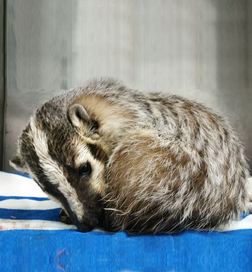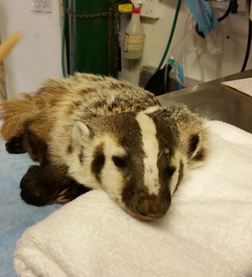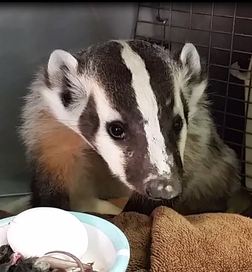WildCare's Wildlife Hospital treats nearly 4,000 ill, injured and orphaned wild animal patients from over 200 species every year. This is one patient's story.

Not sure how to deal with a badger, which can be quite intimidating, even when small, the badger's rescuers called WildCare's Hotline for help. Our Hotline operator walked them through safely containing the badger in a carrier, and instructed them to call the local Humane Society to transport her to WildCare.
Upon her admission to the Wildlife Hospital, intake notes on the badger's medical chart say she was "very lethargic and easily handled, lying curled up and shivering."
Medical Staff put her on heat and oxygen immediately, and performed an extensive intake exam. The young animal was mostly unresponsive and seemed barely conscious.
In the video above, taken the morning after she arrived at WildCare, you can see how very sick this young badger was during her first days in care.

What had happened to this badger? Based on her symptoms, Medical Staff worried that she could indeed have distemper, although her lethargy could also be explained by head trauma (were she and her mother hit by a car?), or even by exposure to rat poison.
Her medical chart noted internal bleeding, presenting with bloody stool and some blood from her nose. Such bleeding can be a symptom of both physical trauma from being hit by a car or from exposure to anticoagulant rat poisons. Because her symptoms were all consistent with trauma, distemper or rat poison exposure, Medical Staff treated for all possibilities until each could be ruled out.
The badger remained docile and mostly unresponsive through exams, radiographs and tests. Medical Staff put her on distemper quarantine and sent a swab to the lab to test for the disease. In the meantime, they gave her injections of Vitamin K to counteract potential rodenticide exposure and provided pain medications and antiflammatories in case she had been hit by a car. Radiographs had been inconclusive.
Over the next two days, Medical Staff continued to give the badger subcutaneous fluids and medications appropriate for her symptoms. They kept her warm, and periodically offered her a nutritious protein slurry through a tube called Carnivore Care in hopes she would eat.
She was able to take in very few calories, however, and her prognosis at this point was very poor.
To everyone's surprise, on the third day, this once nearly comatose patient seemed to perk up, accepting Carnivore Care from a tube with better coordination and more enthusiasm. She even started swallowing small pieces of defrosted mouse placed in her mouth with tweezers.
Thankfully, the canine distemper PCR test results had come back negative, so, with concerns about that deadly virus put to rest, and her increased alertness and appetite, this young animal's prognosis was suddenly much improved!
Over the next couple of days, the little badger slept a lot, often in very funny positions. Who knew badgers will sleep on their backs with their paws up like contented house cats?
Watch her in the video above, taken on day four, as she actively devours small bites of food... Everyone at WildCare was very excited by her improvement.
From this point onward, this young animal's return to health was exponential!
An entry in her chart a day or two later notes that she was still only eating if hand-fed from tweezers, and that she was still lethargic... until you started taking the food away.
When Medical Staff acted like they were finished with feeding and started pulling back the piece of food they were offering, the badger would lunge with a snarl and snatch it from the tweezers! Very badger-like behavior indeed!
Finally, after a little more than a week in care, this once weak and lethargic patient had become a bright-eyed, well-fleshed, appropriately defensive and very hungry badger!
You can see her in the video above, munching on tasty treats like mice and fish. Turn up the volume to hear her grunting as she eats. That is the real-time audio for the video.
Unfortunately, at WildCare's current out-dated facility, we simply do not have the caging or space to accommodate a large burrowing animal like this one for the remaining weeks of her rehabilitation before she can be returned to the wild.
WildCare is eagerly anticipating our development of and relocation to our new, larger and better facility near McInnis Park in San Rafael, California!

The badger will stay at this other center for another two to three weeks, at which point she will be brought back to her home county of Marin.
With the help of a local biologist, we will release her to a badger-appropriate territory near where she was found, healthy and 100% ready to be wild.
WildCare is a 501(c)3 nonprofit organization supported almost entirely by private donations and individual memberships. Visit us online at wildcarebayarea.org.
